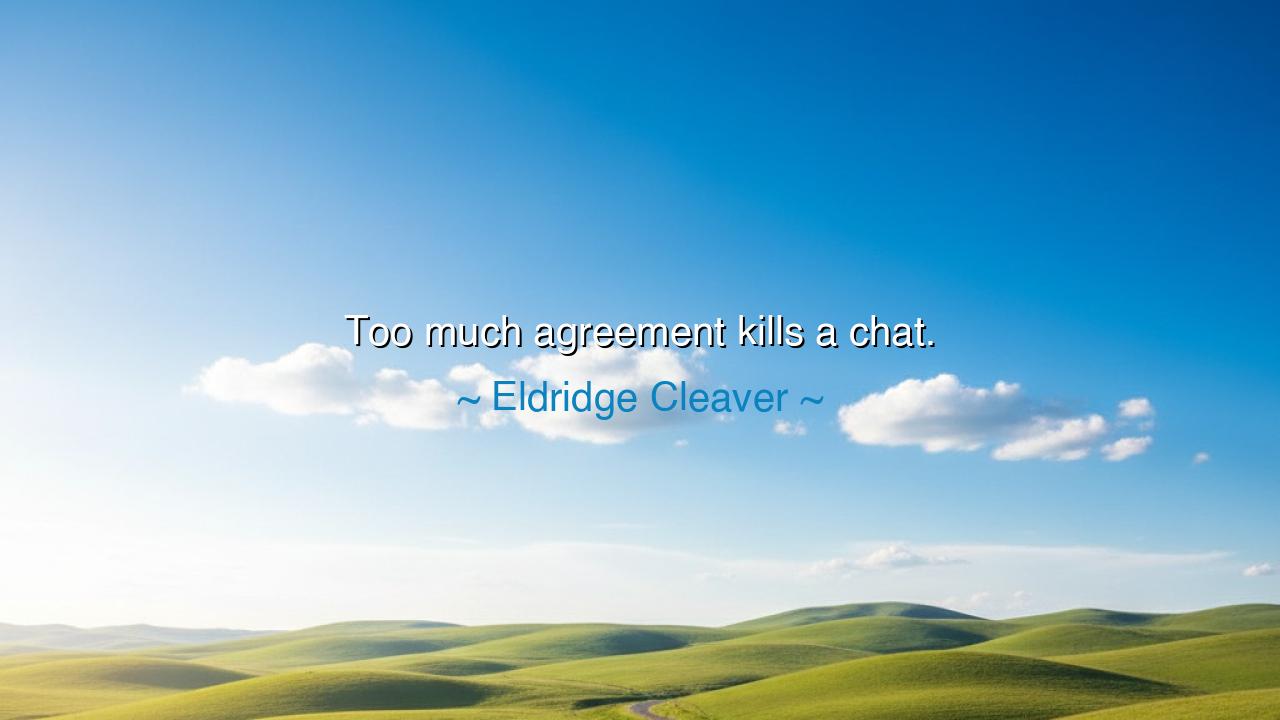
Too much agreement kills a chat.






"Too much agreement kills a chat." These words, uttered by the philosopher and social activist Eldridge Cleaver, speak to the very soul of human interaction. At first glance, they may seem paradoxical—how can too much agreement be detrimental? But as with all great wisdom, the deeper meaning emerges when we contemplate the nature of true conversation, of dialogue, of human connection. In this world, where silence is often misunderstood and conformity is too frequently celebrated, Cleaver’s words ring with a clarion call to awaken our senses to the true value of dissent, diversity, and honest engagement.
In the ancient days, the elders would gather in the village square, and there, beneath the eternal stars, the people would speak of great matters—of the harvest, of war, of the stars above. These discussions were not merely about finding common ground, but about testing the mettle of ideas. The exchange of thought was a battle of sorts, where truth was not a singular object to be claimed, but a flame to be kindled, tested, and kept alive through the constant fanning of debate. If all agreed, there would be no progress, no evolution of thought. Silence would descend, and with it, stagnation.
This is where Cleaver’s insight finds its root. Agreement—when it flows too freely—becomes the water that stills the river’s course. The chat, the conversation, the very lifeblood of human discourse, must pulse with the energies of dissent, of challenge, of reflection. When we all speak in the same voice, when every word is met with an echo of affirmation, we cease to be engaged with one another. The exchange of thoughts becomes a ritual, devoid of the spark of true interaction. Thoughts, once vibrant and diverse, wither into uniformity. The light that comes from different perspectives fades into a dull monotony.
Cleaver understood that real growth—the growth of societies, of individuals, of ideas—arises not from the comfort of certainty, but from the tension of opposition. Look, if you will, to the great philosophers of ancient Greece, who spent countless hours in dialogue, questioning, probing, seeking. Socrates was no stranger to dissent—his life was a living testament to the fact that knowledge is born not in agreement, but in the relentless search for deeper truths. The Platonic dialogues were not about finding simple consensus but about uncovering deeper, often uncomfortable truths through the push and pull of thought.
Consider, too, the great Revolutionaries of history—those who did not settle for easy answers or comfortable truths. Martin Luther King Jr., a man whose voice echoed across the tumultuous civil rights movements of the 20th century, spoke to a world that, in many places, had long been silent in its agreement. His words stirred discord, ignited passion, and demanded action. It was not the calm waters of easy consensus that propelled the march for justice, but the relentless current of ideas and voices that refused to bow in quiet submission.
In the same way, when we engage in our own conversations—whether in family, friendship, or society—we must learn to embrace conflict. Not for the sake of chaos, but for the purpose of growth. The lessons of history, the stories of our ancestors, tell us that a world that refuses to challenge, to question, to probe deeply, is a world destined to stagnate. It is in the tension, the wrestling of ideas, that we find innovation, that we find the breaking of new dawns.
And so, the lesson here is clear: agreeing too readily, too passively, shuts down the very essence of human connection. True understanding comes not from finding the same answer, but from exploring the questions together. Disagreement, when rooted in respect and curiosity, fosters growth, for it forces us to reconsider, to challenge, and to refine our beliefs. We must invite tension into our conversations, not as a weapon to harm, but as a tool to sharpen the intellect, to deepen the soul, to bring about the very change we seek in the world.
As we move forward, let us remember the wisdom of Cleaver. Agreement, while peaceful, is not always productive. Disagreement, while challenging, is the very heart of intellectual progress. Let us cherish our differences, for they are not the enemies of harmony, but the foundation of true understanding.






AAdministratorAdministrator
Welcome, honored guests. Please leave a comment, we will respond soon